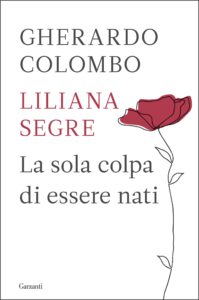“Graduation essay’s topic on Liliana Segre and 1938, an opportunity to evaluate the schools’ work”
 In the book written with Gherardo Colombo, the Senator For Life Liliana Segre tells her own life journey, starting from the shame of the Racial Laws in 1938 and the resulting suffering of being expelled from school. A written work that invites the reader “never to turn the eyes away from injustice, to make sure that the darkest pages of our history are never repeated”.
In the book written with Gherardo Colombo, the Senator For Life Liliana Segre tells her own life journey, starting from the shame of the Racial Laws in 1938 and the resulting suffering of being expelled from school. A written work that invites the reader “never to turn the eyes away from injustice, to make sure that the darkest pages of our history are never repeated”.
Introducing this work among high school graduation essays is not a predictable choice, as Colombo pointed out to Pagine Ebraiche. He invited us to reflect on Segre’s words and their meaning. “I hope that in this period of such widespread hatred, Liliana Segre’s feeling, her life, her choice not to hate despite what she went through, will be useful. “It is a way – Colombo underlines – to show that there is a different path compared to the endless number of wars we have around us, compared to the hatred that runs on social networks”. As a former magistrate, he then hopes that the students will also remember the post-war efforts to restore justice, to respond to the discriminatory laws of the fascist regime with the norms of democracy. “I hope that in some essays will be mentioned the attempt of our Constitution to banish discrimination once and for all. And thus the attempt to create a society that is as inclusive as possible. We will see what will come out. I have met thousands of students over the years, but most importantly, Liliana has met them. And I wondered what will they remember of her story”.
Marcello Pezzetti shared this question. With his colleague Liliana Picciotto in the 1990s, he had accompanied Segre to platform 21, from where she was deported to Auschwitz with her father Alberto in January ’44. “Thirty years have now passed since that moment, a Holocaust Memorial was erected there. And now we wonder what awareness there is in our society, in young people, in regard to our past. The ministry’s important choice of the essay topic on Segre – he says – can help us understand where we are. Did the Italian students arrived at what in Germany is called Vergangenheitsbewältigung, the awareness of one’s past?”.
While waiting for answers on the subject, the topic of Racial Laws included in the essays of the “Matura”, the Italian graduation exam, is in itself a positive sign, Picciotto points out. “It tells us that our rulers have understood the importance of that historical passage, also thanks to Segre’s constant work. And we can clearly see that this is an excellent opportunity for everyone, both children and parents, to reflect on the past. It is an opportunity for a national awareness” adds the historian of the Cdec (Center of Contemporary Jewish Documentation) in Milan.
Anna Segre, a teacher in a Turin high school, then intervened from an internal perspective. “Liliana Segre’s story and the effects that Racial Laws had on her as a child can be very engaging for youth, who could easily identify with it. It is interesting – she notes – that she does not only talk about her expulsion from school (which is the first thing mentioned anyway) but also about lesser-known things, for example the anonymous phone calls with threats ‘die!’, ‘why don’t you die?’. I wonder how much the students will be able to contextualise historically, as required by the essay’s topic.
Colombo and Pezzetti asked themselves this question too. “The risk – says Pezzetti – is that the issue of discrimination will be misleadingly connected to current events. As a historian, I would prefer a development in a specific context: I would like to see an essay with clear references to what has been learnt on Racial Laws, Holocaust, Fascism in the study programme”. On the other hand, he adds, “I understand that it’s Segre’s own words on the need to fight against indifference in the present, what understandably brings us back to current events. The risk then is that the students could fall into distortions”. “It could be a bit dangerous. – Anna Segre points out – In the essay is asked to write down your own thoughts ‘with possible references to other historical contexts’. What references could they make? What if someone brings up the topic of ‘discrimination’ against those who chose not to vaccinate?”. This is another reason why history and remembrance must be, as Picciotto adds, “faced with care and accuracy: the educator has the task of regenerating the topic, with the help of the historian, of course, who reorders the stories accumulated over time”.
Translated by Alice Pugliese, student at the Advanced School for Interpreters and Translators of the University of Trieste, intern at the newspaper office of the Union of the Italian Jewish Communities – Pagine Ebraiche.
